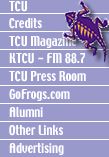|
Friday,
October 26, 2001
Easy
way out
By
Kristin Campbell
Staff Reporter
A few
finance majors were studying together before a test two weeks
ago when another student in the class pulled out an old copy
of the test. The studying ceased and frantic memorization
began.
At a
university which claims the “(education of) individuals
to think and act as ethical leaders,” as its mission,
academic dishonesty is becoming a growing concern.
One senior finance major said he studies for tests, but also
cheats to increase his chances of getting good grades.
“Cheating
is a good way to improve your status,” he said. “There
are many pressures on students to get good grades, such as
parental expectations and scholarship requirements.”
While
avoiding blatant cheating, such as looking at a neighbor’s
answers during a test or plagiarizing, the student said he
takes advantage of “gray areas.” He said collaborating
and studying from old tests obtained without the professor’s
permission to be cheating, but those activities are not always
thought of as cheating.
“I don’t know anybody who is above looking at an
old test,” he said. “When an old test comes out,
everybody comes running.”
Elissa
Winder, a junior speech communication major, said although
she does not cheat, other students cheat because either it
makes good grades easier to obtain or they are just too lazy
to study.
“I
always am concerned about keeping my grades high enough to
keep my scholarship, but it always works out,” Winder
said. “I always end up pulling it off.”
Mike
Russel, associate dean of campus life, said although other
schools have a short honor code, TCU does not. Instead TCU
uses the Code of Student Conduct.
“It’s common sense,” Russel said. “(The
code) gives us a formal structure to respond to students whose
behavior is unacceptable.”
Russel
said to his knowledge, statistical analysis data on cheating
at TCU is not available and there is not a centralized record
of all formal and informal incidences.
The introduction to the Code of Student Conduct states that
students take on academic performance responsibilities when
they enter TCU. It also states that “all students are
expected to know and abide by this code of student conduct.”
The definitions
of cheating, plagiarism and other dishonest academic practices
are printed in the TCU Student Handbook but many students
are unaware of the policy.
Handbooks are distributed in dormitories and in the Registrar’s
Office.
According
to the TCU Student Handbook, penalties for cheating range
from being dropped from the course with an “F” to
expulsion from the university.
Katie
Schmitz, a sophomore pre-major, said she has no idea what
TCU’s Code of Student Conduct is, nor where she would
find the information. She is but one of many.
George
Brown, a theater professor, said although a code exists most
students do not even know what it is or where to find it.
“The
bigger issue is not enough students invest themselves in that
code,” Brown said. “Having a code does not mean
anything until students understand they are cheating themselves.
We no longer send students to the principal’s office.”
When
it comes to dealing with cheating, Russell said, faculty are
left to make their own decisions. In most instances, faculty
will discuss the incident with the student. If the professor
chooses to report the cheating formally, then the case is
handled by the academic appeals committee, according to the
procedures outlined in the student code of conduct.
Richard
Galvin, a professor of philosophy, said cheating is prevalent
in the large, freshman-level class he teaches jointly with
colleagues Gregg Franzwa and Blake Hestir. He said he makes
several different test versions or just changes the order
of the questions for in-class essay tests to make it difficult
for students with roaming eyes to copy their neighbor’s
answers.
Galvin
said students who cheat put the honest students at a disadvantage.
He said students have informed him when cheating is happening.
“The
temptation to plagiarize is great,” Galvin said. “Faculty
need to be vigilant and make sure students are evaluated fairly.”
Schmitz
said she does not cheat but that she does not feel bad helping
others do so.
“If a friend needs to cheat off me, that’s fine,”
Schmitz said.
Kristin Campbell
k.a.campbell@student.tcu.edu
|
